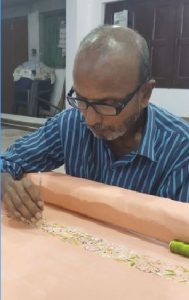 The national lockdown due to Covid-19 pandemic has severely hit the moribund traditional, delicate and exotic artwork of “Chikankari” and “Zardozi” rendering more than two and a half lakhs artisans jobless and making their economic survival hard in the tough times. The closure of business activities and markets further added woes and miseries to their hard times. The lockdown period is actually considered the peak season for this Industry which suffered an estimated revenue loss of 2,500 crores because this summer sales completely washed out.
The national lockdown due to Covid-19 pandemic has severely hit the moribund traditional, delicate and exotic artwork of “Chikankari” and “Zardozi” rendering more than two and a half lakhs artisans jobless and making their economic survival hard in the tough times. The closure of business activities and markets further added woes and miseries to their hard times. The lockdown period is actually considered the peak season for this Industry which suffered an estimated revenue loss of 2,500 crores because this summer sales completely washed out.
Chikankari is a traditional embroidery style from Lucknow, Uttar Pradesh. It is one of Lucknow’s best known antique craft whereas Zardozi embroidery is beautiful metal embroidery, which once used to embellish the attire of the Kings and the royals in India. Zardozi embroidery work involves making elaborate designs, using gold and silver threads. Chikankari is traditional embroidery done using a needle and several types of threads whereas Zari-Zardozi work is made with golden and shiny sequins and other decorative materials. Chikankari and Zari-Zardozi work are registered in the G.I. Lucknowi embroidery is popular all over the world.
“Chikankari” is a very delicate and intricate shadow work type of embroidery. Initially, the embroidery was done using white yarn, on colourless muslins known as tanzeb. The stitches used in Chikankari work of Lucknow are basically of three categories, namely Flat Stitches (Subtle stitches that remain close to the fabric), Embossed Stitches (they give a grainy appearance) and Jali Work (Created by thread tension, it gives a delicate net effect).
However, fashion designs and growing market innovative tends extended this unique artwork on georgette, chiffon, cotton and many other fine fabrics. From being an embellishment used primarily for decorating clothes, “Chikankari” embroidery work of India has now spread to cushion covers, pillow covers, table covers, and linen. The world-famous textile embroidery handicraft of Chikankari” and “Lucknow Zardozi” are Geographical Indication (GI) recognised brands.
These artisans say that they make Chikankari and Zardozi garments for Bollywood actresses to foreign designers. They designed glamorous Saris, Dupattas, Lehengas and Suits that go all over the world for celebrities. But since Covid-19 pandemic gripped the world the orders are not coming from abroad. Even money transactions are not happening. In such a situation, it has become impossible to run their livelihood and other household expenses.
Uttar Pradesh has been a home to many handicraft clusters, which have continued to flourish over the decades. These traditional crafty artworks have been predominantly flourishing in Lucknow and the six adjacent districts -Barabanki, Unnao, Sitapur, Raebareli, Hardoi and Amethi- earlier known as Awadh region once ruled by Nawabs.
One such cluster of Chikankari and Zardozi handicraft is Lucknow and its surrounding 7 districts. This cluster supports an estimated 2,50,000 “Chikankari” and “Zardozi” artisans and around 10,00,000 people directly involved in the supply and value chain. There are over 10,000 micro and small enterprises engaged in manufacturing of Zardozi products like apparels, home furnishing, shoes, bags etc. in the region. These products are sold all over India and also exported to different parts of the world. Chikankari and Zardozi work in Lucknow is completely shut down.
The proprietor of Kalatmak Handicrafts M.N. Lari told Tehelka that this handicraft industry has suffered heavy losses of around 2500 crores till now and it is difficult to say when normalcy will return in the markets. Last year this industry exported products worth approximately of 200 crores and we were hopeful of doing better this year. The online business also collapsed due to sudden halt of transportation machinery. March to April being the main season of this product being summer wear clothing, the Industry is bound to suffer huge losses to the tune of 2500 crores or more.
Mr Lari told that worst suffers are poor artisans who are about 2.5 lakh in numbers besides the industry give indirect employment to around 10 lakhs people. These artisans have turned unemployed as they survive on just meagre amount of 150-250 a day even less than statutory minimum wages fixed for an unskilled daily labour because they have no organised voice against their torturous exploitation. These artisans say that their workshops, which are the only source of their livelihood, are closed due to lockdown. They have fell in the deep-rooted debt traps of traders who lend them money in the distress at exorbitant rates of interest which they fail to clear throughout their life, thus, allow their torturous game. They also give them cloth and material with designs and extract best of their talent.
Presently the traders are in the grip of deep economic crisis as they failed to complete their bulk supply orders. It is worth mentioning that apart from Uttar Pradesh there is a huge demand for Lucknow Zardozi and Chikankari clothes all over the country in the various showrooms of multinational fashion brands and also abroad because of its smoothness and well-designed attractive simplicity.
Tourists coming to see historical monuments of Lucknow also make it a point to visit local markets with deep interest in the traditional fine art work of Zardozi and Chikankari that keep them reviving their moribund family art work. There are about 100 big entrepreneurs including chicken and Zardozi and about 4,000-5,000 small and medium entrepreneurs. 80-90 per cent of whose business is from foreign tourists or export.
The famous Zardozi and Chikankari work of Awadh (Lucknow) has come to a complete halt in lockdown. Everyone from artisans to merchants are facing economic crisis. Daily wager artisans have written to the Chief Minister demanding financial assistance as given to building construction workers and other labourers in addition to free ration support.
The traders expect that it may take one or two years to get out of the crisis caused by the corona virus. Most of the traders complain that the Goods and Services Tax (GST) and the lockdown due to Corona virus have almost finished their business. The manufacturers are worried about the uncertain future of the business.
“We are in the grip of acute depression keeping in mind the declining trend of economic growth of the country that indicate our grim future,” said prominent Chikan garment merchant Ajay Khanna.
Another businessman Lucknow’s Chowk Bazar Sunil Khanna said, “Almost ninety per cent of chikankari artwork is done by women who live in various adjoining districts and villages in and around Lucknow. The new workers get 150 and veteran artisans get maximum 300 a day as remuneration. “There has been a delay in payment of wages to the artisans due to inadequate liquidity in the market which is beyond our control,” he explained.
“Manufacturers of Lucknow’s are now disappointed over drop in their business that it may take a year or two to come back on recovery path,” feels Chikan manufacturer Mukesh Rastogi of famous Chikan Kala outlet.
An artisan of Zardozi craft profession since 2000, Asif Ali Muzzafar says that the number of Zardozi artisans in Lucknow and surrounding areas may be in lakhs of numbers but most of them are facing economic distress due to lockdown and slump in the market. Though the Ministry of Textiles (Handicrafts) had registered more than 15000 artisans for extending benefits of promotional schemes but none of them got financial support in their bad times.
Anjuman Zardozan (Organization of Zardozi Artisans) strongly felt that the government has ignored the plight of artisans in times of crisis who work alike other labourers despite being finely skilled in their profession. The Secretary of the organization, Jio Agha alias Noor told Tehelka, “Zardozi business was already facing the brunt of GST. Now the unexpected lockdown has broken our back. If the central and state governments did not help us then the art of Zardozi will not be able to survive and could extinct for ever.”
A registered Chikan artisan with ministry of Textile, Samar Fatima said, “At the moment I am running my household borrowing money from lenders because of the lockdown I have not been able to send the finished goods to the manufacturer and could not receive due remuneration of my work.”
The glamourous shining world of Chikankari and Zardozi artwork is totally unaware of its dark side where no legislative frame work is enacted to ensure fair minimum wages and social security protections to ensure smooth livelihood and safe future of these artisans. Textile Ministry has a complete database of registered artisans but it did nothing to enact a legislative framework for giving them dignified life with economic and social protections.
letters@tehelka.com













